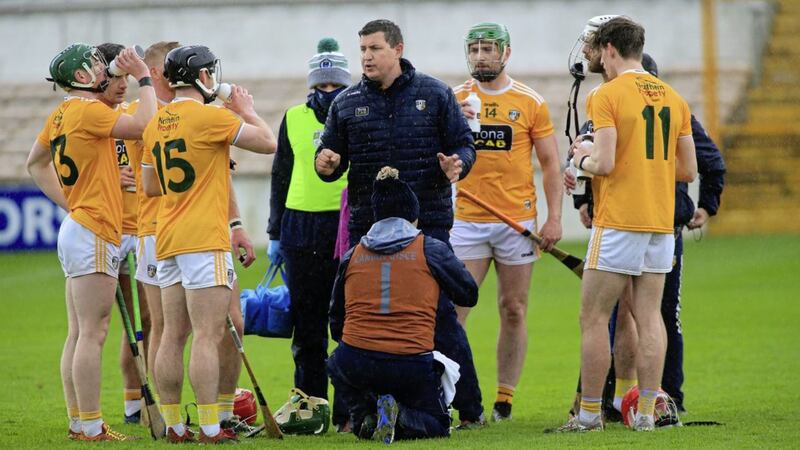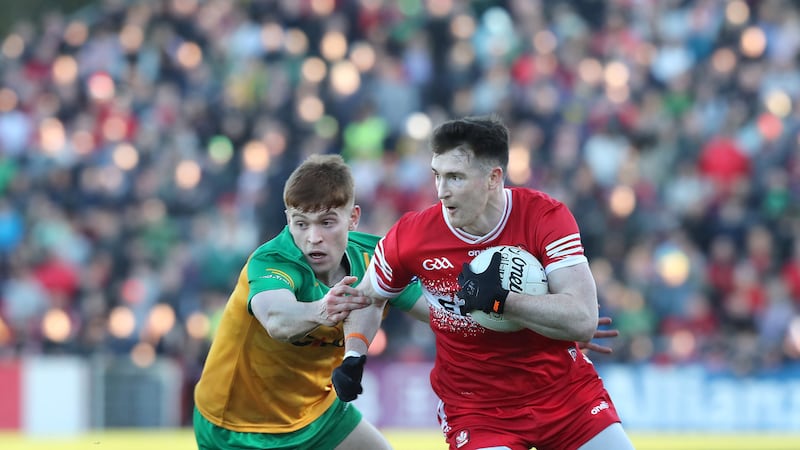WHEN the short history of water breaks is written there are many who’ll argue with a fair degree of conviction that their introduction changed the course of some championship outcomes.
Managers, coaches, players and supporters will be able to cite many examples of how water breaks proved to be decisive momentum-breakers and in those game-defining 60 seconds of respite – give or take 10 or 20 extra seconds – all was either won or lost.
Yesterday, the GAA officially called time on the much-maligned water breaks – which were originally introduced on player welfare grounds so that players could get properly hydrated as well as to guard against the sharing of water bottles during the worst excesses of COVID.
Many around Crossmaglen will argue the move came two months too late.
The 2021 Armagh Senior Football Championship final between ’Cross and Clann Eireann is probably one of the most high-profile examples of how the water breaks had a major say in the outcome.
Without them, in all likelihood, Crossmaglen Rangers would have been celebrating their 46th county title – and not their opponents Clann Eireann who won their first in 58 years.
Not many in the Clann Eireann camp will disagree with that assessment either.
In the November 14 final, ‘Cross were cruising to victory. Five ahead and looking to tag on more scores, the second half water break came and completely broke their momentum and enabled Tommy Coleman’s Clann Eireann players to regroup and make tactical changes.
When the game resumed, the Lurgan men hit an incredible 2-6 and clinched the Gerry Fagan Cup with two points to spare.
“Without that water break we probably wouldn’t have won the championship,” Coleman says matter-of-factly.
“Originally, I wasn’t happy when the water breaks came in. But as we got used to it I found them very, very useful. The water breaks were crucial to us in a number of championship games because when you’re in the cauldron of the championship and the crowd are there it’s hard to get your message across.
“We were slow starters in games but we worked them to our advantage.”
“In the final against ’Cross, it allowed us to settle the players down and not to panic,” Coleman explains.
“We abandoned our sweeper system, we pushed up and we chipped away at Crossmaglen’s lead. Lo and behold, we got the goals and the rest is history...”
Given the unforgettable year Clann Eireann had, it's no surprise Coleman would have happily retained water breaks.
However, they were always seen as a temporary measure, and with the data and science looking more favourable than it has ever done since the beginning of the global pandemic, the GAA were happy to call time on them and revert back to two normal halves rather than effectively four quarters of playing time.
“The rationale behind the water breaks was purely for the health and well-being of players,” said the GAA’s Communication’s manager Alan Milton.
“You need to keep players hydrated not just in the summer - there’s a fallacy out there that it’s only relevant to warm weather, it’s not.
“We had to give players the opportunity to get water in a safe way, you couldn’t be sharing bottles.
“You could argue it morphed into something else. Lots of teams availed of it for reasons we didn’t intend it to be used for.”
The way water breaks evolved shouldn’t have come as a major surprise to the Association.
“As the games went on you could see managers bringing out tactical boards and probably next to no water bottles,” says former Antrim goalkeeper Chris Kerr. “It became more of a tactical break.”
In the early throes of its introduction, St Gall’s were famously caught on the hop during a 2020 championship group game with St Enda’s.
Slow to return to the field of play after the water break, the referee allowed the play to resume and as the St Gall’s players sauntered back onto the field, St Enda’s were able to walk the ball into the net. Fortunately from a St Gall’s perspective, the soft goal didn’t prove costly in the end.
“The St Enda’s boys were already on their way out,” recalls St Gall’s clubman Kerr, who was watching the game.
“St Gall’s were in the far corner of the pitch, so we couldn’t have been further away from the goal at the clubhouse end that we were defending.
“It was one of those things. It was a lesson for everybody.
“It was probably the first time refs were told to keep a strict minute on it as opposed to a bit longer because players were coming back from a long lay-off and it wasn’t as strict initially. Come September/October, there was a stricter timer put on it.”
Kerr adds: “In our next game we had two separate water breaks where the defenders all stayed in the half of the pitch they were defending and the forwards stayed in the other half of the field.”
Kerr is happy to see the back of the water breaks and for Gaelic Games to return to their two traditional halves of play even though he found them to be helpful as a goalkeeper.
“You could dictate the next set-play if you had the ball on your tee. But you’d be watching some games and it was up and down, ebbing and flowing, and all of a sudden the game is stopped for a water break.
“I think it’ll be good to go back to the way we were playing before.”
Antrim senior hurling manager Darren Gleeson says some days the water breaks went for you and other days against you.
He bitterly recalls how his side’s momentum was completely busted in their Leinster Championship relegation play-off with Laois last season, while he took advantage of a water break in their drawn NHL game against Wexford at Corrigan Park when they were on the ropes in the early stages.
“I think referees will be delighted to see them go,” Gleeson says. “When was the right time to call them? Was it the 15th minute or the 17th minute? I’m glad they’re gone.”
The London footballers suffered the biggest momentum-breaker of the lot. Because of travel restrictions, the Exiles haven’t played a competitive game in 23 months as they make their long-awaited return against Carlow on Saturday.
Boss Michael Maher may know a thing or two about momemtum-breakers and water breaks.
“It’ll be nice to get back to the full half,” says Maher. “You want players to have the freedom to react to situations – players don’t develop unless they’re free to make decisions on the pitch.
“One thing we want to do is empower the players to make decisions that they feel best, and if you’re speaking to players throughout the game there can be a serious information overload.
“I personally feel they are better for the game if they’re not there.”




